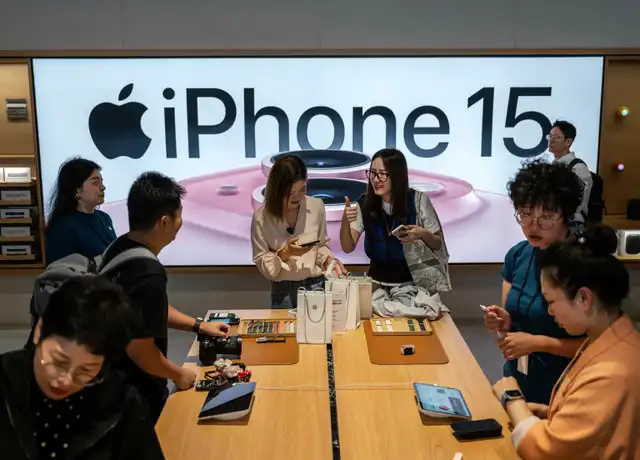Analysts considered the introduction of Apple Intelligence to China a marathon and not a sprint to agree on solutions
Apple’s AI efforts face some big challenges in China — one of the most important markets for the iPhone maker — where Beijing maintains strict rules around interesting technology.
China’s uncertain path comes at a time of eroding share Camel In the market in the world’s second-largest economy due to the return of Huawei and other local smartphone companies, which are talking about their artificial intelligence features.
“Apple Intelligence” is the focus of the Cupertino giant that aims to bring artificial intelligence across its devices. It features an improved version of Apple’s Siri voice assistant, as well as features that automatically organize your email or transcribe and summarize audio clips.
Apple said Apple Intelligence will launch in US English this fall, with additional languages, features, and platforms arriving over the next year. However, the company was quiet about showcasing the products in China while launching the AI at its annual developers conference this month.
CNBC reported, citing analysts, that this likely has something to do with China’s strict rules on artificial intelligence, as Apple tries to figure out how to deal with the complex market.
China is in another world when it comes to AI given the regulatory environment there, so China is a big exception to Apple’s big announcements last week,” said Brian Ma, vice president of hardware research at IDC.
This comes as Beijing has enacted various regulations over the past few years focused on areas ranging from data protection to large language models – the huge sets of data that support applications such as ChatGPT.
China’s AI market is strictly regulated. Some rules include requirements for LLM providers to obtain approval for commercial use of their models. AI providers are also responsible for removing “illegal” content.

The artificial intelligence challenges that Apple faces in China
Navigating these rules will be difficult for Apple.
First, some Apple Intelligence features rely on Apple’s own language model, which runs on both the phone and on the company’s own servers.
Under Chinese rules, Apple would likely need to obtain approval from authorities for its AI model.
Second, one of the biggest announcements this month was Apple’s Siri voice assistant, which can leverage OpenAI’s ChatGPT for certain requests — but ChatGPT is banned in China, meaning Apple will have to find an equivalent local partner.
Baidu and Alibaba are among the tech giants in China that have their own voice assistants, positioning them as companies with which Apple could collaborate.
Meanwhile, China’s internet is heavily censored, with regulators concerned about the possibility of artificial intelligence services creating content that might conflict with Beijing’s views or ideology.
The likelihood is that Apple will have to build an on-device AI model and a cloud-based AI model that complies with local regulations, Canalys analyst Nicole Peng told CNBC via email.
The other part of the AI equation for Apple’s success in China, according to CCS Insight senior analyst Ben Wood, is for the company to create a homegrown AI experience on its devices that appeals to Chinese users.
“Localizing the Apple Intelligence experience will be a huge challenge for Apple,” Wood told CNBC. “As with all technology deployments, there are nuances in the way the service is delivered to respect the specific customs, regulations, and use cases in a particular country.”
Privacy
A key part of Apple’s pitch during its AI launch was its focus on privacy.
The company announced private cloud computing, where artificial intelligence is processed on servers owned by Apple. Apple said that the processed data is not stored.
But there is another question, whether the tech giant will be able to completely own its own servers. Your Chinese iCloud data is stored within servers located in China that are managed by a third party.
This could mean that Apple may need a similar partnership for its AI computer servers, opening the tech giant to criticism about how private the data actually is.
“Maintaining complete user privacy in the age of artificial intelligence in highly regulated markets like China will be Apple’s biggest test yet,” said Counterpoint Research partner Neil Shah. “It will be difficult for the iPhone maker to have private computing servers that it controls.” completely in China.
Wood of CCS Insights said Apple’s focus on privacy could help bring AI features to market. China passed a major data protection law in 2021, which aims to limit how information is collected and stored.
“Apple’s continued focus on privacy and security practices may help appease local regulators, and Apple has not been afraid to compromise when needed,” Wood said.
Apple’s path to artificial intelligence in China
For his part, Apple’s CEO said that the process is underway to introduce artificial intelligence products to China, but he did not mention a timetable.
Smartphone makers globally are talking about their AI features as a way to sell high-end phones to consumers who want to keep their devices longer.
Apple faces a number of challenges in China, as its market share fell to 15% in the first quarter of 2024, compared to 20% in the same period of the previous year, according to Canalys data. Huawei, whose smartphone business was paralyzed by US sanctions, has rebounded and is now the largest smartphone company in China, competing with Apple with phones targeting the upper segment of the market.
Apple’s lag behind its local competitors in launching artificial intelligence features in China is unlikely to affect iPhone sales.
“Apple’s AI introduction in China will be a marathon over a number of years, not a sprint,”